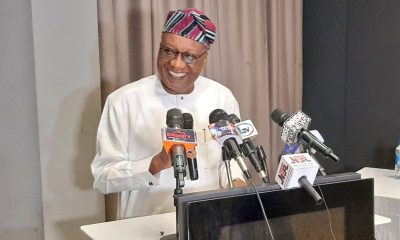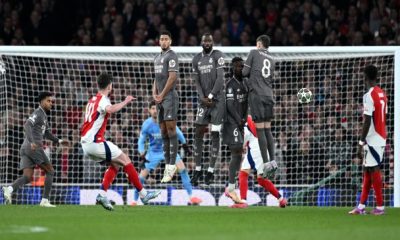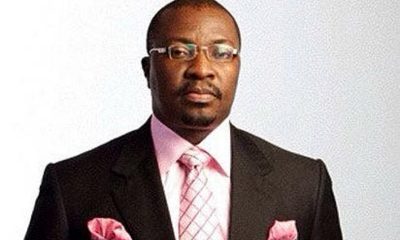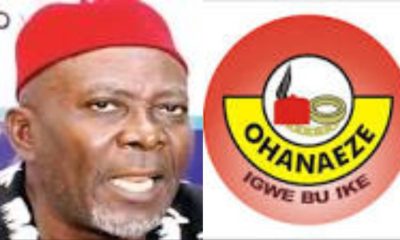International
Kenya Elections 2022: Raila Odinga and William Ruto in Tight Race for President

Kenyans are choosing their next president after an intense campaign dominated by debates about living costs, unemployment and corruption.
Outgoing President Uhuru Kenyatta, having served the constitutionally limited two terms, is backing one-time foe Raila Odinga, 77, to succeed him.
His decision followed a falling out with Deputy President William Ruto, 55, who had expected to be endorsed.
More than 22 million Kenyans have registered to vote.
There are several other elections happening at the same time and a mix-up of ballot papers in some areas for some of those votes has again raised questions about the organisation of the general election.
Polls are open for 11 hours from 06:00 local time (03:00 GMT). Anyone still in the queue at closing time will be allowed to vote.
The results of the last presidential election in 2017 were annulled after the Supreme Court ruled that the electoral commission had not followed the law when it came to the electronic transmission of the vote tallies from the polling stations.
READ ALSO:
Judges ruled that “illegalities and irregularities” had taken place.
A re-run was won by Mr Kenyatta, but boycotted by Mr Odinga – the main opposition candidate at the time.
The chairman of the electoral commission, Wafula Chebukati, who was also in charge of the 2017 vote, has frequently tried to reassure Kenyans that his team will be up to the task this time.
But Monday’s logistical problems have increased the pressure on him.
Baba v Hustler
This election looks like it will be a tight race between frontrunners Mr Odinga and Mr Ruto.
Two other candidates – David Mwaure and George Wajackoya – are also in the race.
Despite the campaign being dominated by issues, ethnic loyalty may also play a part in determining how people vote.
For the first time in the multi-party era none of the main candidates are from the country’s largest ethnic group – Kikuyu.
But knowing that those votes are vital, both have chosen Kikuyu running mates.
Voting process
To win the presidential race in the first round, a candidate needs:
- more than half of all the votes cast across the country
- at least 25% of the votes cast in a minimum of 24 counties.
On election day, voters will have their fingerprint scanned to check their identity but a printed register can also be used if the machines fail.
Each voter will then be given colour-coded ballot papers for each of the elections, which they will mark in a private booth and drop in the relevant ballot boxes.
Counting will start at the polling stations shortly after voting ends. Officials will then take a photo of the final tally and send the image to both the constituency and national tallying centres.
To ensure transparency the media, political parties and civil society groups have been urged to run their own tallies using final results declared at the more than 40,000 polling stations.
But only the electoral commission can declare the winner of the presidential election after verifying the physical and digital forms sent to the national tallying centre.
The main presidential candidates have vowed to respect the result of the elections.
NPO
International
US announces new visa requirements for Nigerian applicants

US announces new visa requirements for Nigerian applicants
The U.S Mission in Nigeria has listed new requirements for visa applications at its Abuja and Lagos embassies starting from April 22, 2025.
The Mission announced the new requirements in a short statement published on its X handle on titled Important update for Visa Applicants.
Read the new requirements for applicants for U.S visa from Nigeria below
Visa Interviews: Starting April 22, 2025, all visa applicants in Abuja and Lagos must bring a DS-160 visa application form with a confirmation/barcode number (starting with AA and followed by 00 – two zeroes) that matches the one used to make their appointment online. You also must make your appointment in the location you selected when filling out your DS-160.
Matching Barcode Numbers: If the confirmation/barcode number on your DS-160 form does not match the one you used to book your appointment, you will not be allowed to enter the Consular Section or attend your visa interview.
READ ALSO:
- Troops repel terrorists’ ambush in Borno major city
- Bauchi man arrested for impregnating 17-year-old daughter
- Rivers emergency rule: NBA moves annual conference from PH to Enugu
Double-Check Your Information: At least two weeks before your interview, please double-check that the barcode number on your DS-160 form matches the one you used to schedule your appointment. You cannot reuse a DS-160 from a previous application.
Correcting DS-160 Barcode: If your DS-160 barcode is incorrect, you must log into your AVITS account at at least 10 days before your appointment to create a support ticket requesting correction of your barcode number.
Rescheduling Appointments: If you are turned away from your appointment because your barcode numbers do not match, once you correct the problem, you will need to book a new appointment to proceed with your visa application. You may book a new appointment by logging into your AVITS account at If your visa fee has expired, you may have to pay a new fee before booking.
US announces new visa requirements for Nigerian applicants
International
EU approves 1st retaliatory tariffs on U.S. imports

EU approves 1st retaliatory tariffs on U.S. imports
EU member states on Wednesday approved initial retaliatory tariffs of 10 per cent to 25 per cent on U.S. imports, which the European Commission says will be implemented next week.
This includes special levies on items such as jeans and motorcycles from the United States, while U.S.-made whiskey and other alcoholic beverages were removed from the commission’s proposed list.
Further counter-tariffs are due to be imposed in mid-May and at the end of the year, affecting products including beef, poultry and citrus fruits such as oranges or grapefruit.
Additional tariffs on nuts and soybeans are planned for early December.
READ ALSO:
- Israeli strikes kill 20 in fresh attack on Gaza
- Nigeria spends over $21,000 to train one doctor — Health Minister
- Dominican Republic: At least 98 die in club roof collapse
The tariffs approved on Wednesday are in response to the U.S. tariffs on steel and aluminium imports imposed about a month ago.
According to EU calculations, the U.S. measures affect exports worth 26 billion euros (28.8 billion U.S. dollars).
The measures being imposed by Brussels target goods worth approximately 21 billion euros, according to EU sources.
The EU has stressed its preference for negotiations rather than escalating the trade dispute.
Work is still under way on a further package of measures in response to the tariffs on cars and almost all other EU exports to the U.S. more recently announced by President Donald Trump.
Trump’s tariff policy aims to correct alleged trade imbalances and shift production to the United States, while partially offsetting tax cuts promised during his election campaign.
EU approves 1st retaliatory tariffs on U.S. imports
dpa/NAN
International
Israeli strikes kill 20 in fresh attack on Gaza

Israeli strikes kill 20 in fresh attack on Gaza
Gaza’s civil defence agency said an Israeli strike on a residential building in the Shujaiya area of Gaza City killed at least 20 people on Wednesday, as the military said they were looking into the attack.
The agency’s spokesman, Mahmud Bassal told AFP the strike resulted in “20 martyrs and more than 40 injured” and the search for bodies in the rubble was ongoing.
Israel resumed intense strikes on the Gaza Strip on March 18, ending a two-month ceasefire with Hamas. Efforts to restore the truce have so far failed.
The health ministry in the Hamas-run territory said on Wednesday that at least 1,482 Palestinians have been killed in the renewed Israeli operations, taking the overall death toll since the start of the war to 50,846.
READ ALSO:
- Nigeria spends over $21,000 to train one doctor — Health Minister
- Dominican Republic: At least 98 die in club roof collapse
- Real Madrid can pull comeback against Arsenal, Mbappe confident
Hamas’s October 2023 attack that triggered the war resulted in the deaths of 1,218 people on the Israeli side, mostly civilians, according to an AFP tally based on Israeli official figures.
Hossam Badran, a member of Hamas’s political bureau, told AFP on Tuesday that it was “necessary to reach a ceasefire” in Gaza.
He added that “communication with the mediators is still ongoing” but that “so far, there are no new proposals”.
Badran said Hamas “is open to all ideas that would lead to a ceasefire and stop the genocide enacted against our Palestinian people”.
US President Donald Trump and Israeli Prime Minister Benjamin Netanyahu said on Monday that new negotiations were in the works aimed at getting more hostages released from captivity in Gaza.
Of the 251 hostages seized during Hamas’s attack on Israel, 58 are still held in Gaza, including 34 the Israeli military says are dead.
Israeli strikes kill 20 in fresh attack on Gaza
AFP
-

 metro1 day ago
metro1 day agoWhy Obi’s 15-year-old supporter is in prison — Lawyer
-

 metro2 days ago
metro2 days agoNigerian woman admires polygamy, seeks co-wife for husband
-

 Education1 day ago
Education1 day agoEasiest way to pass UTME, by JAMB registrar Oloyede
-

 metro1 day ago
metro1 day agoINEC names Sam Olumekun as acting chairman
-

 Sports3 days ago
Sports3 days agoChampions League: Arsenal stun Real Madrid 3-0 as Rice delivers free-kick masterclass
-

 Business1 day ago
Business1 day agoFear over 2025 FG revenue target after oil price crash
-

 metro2 days ago
metro2 days agoPerish your 2027 presidential ambitions, APC tells Atiku, el-Rufai
-

 Business2 days ago
Business2 days agoKenyan, Nigerian emerge winners at Pan-African Re/Insurance Journalism Awards in S’Africa













